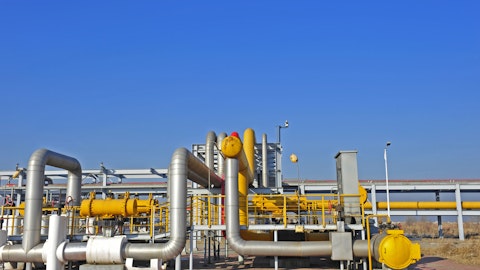Steel City Capital Investments, LLC is the management company of the Steel City Capital fund. Michael G. Hacke is the fund’s founder and managing member. Recently, Steel City Capital released its Q1 2020 Investor Letter – a copy of which can be downloaded here. For Q1 2020, the fund reported a net return of -10.7%, while the S&P 500 returned -20.00%.
In the said letter, Michael G. Hacke spoke about Westlake Chemical Partners LP (NYSE:WLKP) and Tc Pipelines LP (NYSE:TCP) stocks. Westlake Chemical Partners operate, acquire, and develop ethylene production facilities and other qualified assets. Tc Pipelines engages in natural gas pipelines business. Here is what Michael G. Hacke said:
“I have long been wary of investments in master limited partnerships, or MLPs. I never understood the logic associated with issuing equity to support growth projects when there exists ample internally generated cash (why dilute existing owners if you don’t need to?), questioned the veracity of reported “maintenance capex” used to determine dividends, and have long believed their attractive dividend payments to be supported by Ponzi-like financing schemes. That said, there are often “exceptions to the rules” and the Partnership established positions in Westlake Chemical Partners (WLKP) and TC Pipelines (TCP) during the first quarter.
WLKP owns a 22.8% interest in three ethylene production facilities with a combined production capacity of 3.7 billion pounds per year. Ethylene is a building block used in the manufacture of plastic and vinyl. The production facilities have entered into a 12-year Ethylene Sales Agreement (running through 2026) with the company’s corporate parent (Westlake Chemical), pursuant to which the parent has agreed to purchase 95% of the facilities’ planned ethylene production each year. Purchases subject to the agreement occur on a cost-plus basis such that WLKP earns a fixed margin of $0.10 per pound.
In addition to a contract mechanism that provides for a highly visible bond-like cash flow stream, WLKP’s approach to calculating distributable cash flow is among the most robust and intellectually honest I have seen. Specifically, the company reserves ~$30 million each year to finance maintenance turnaround activities that occur every five years. In practical terms, the reserve is akin to a sinking fund that ensures WLKP has adequate resources to finance maintenance turnaround activities without having to raise additional capital and/or reduce its dividend. A less conservative management team – of which there are many in the MLP world – would be apt to distribute excess cash today, potentially to the detriment of the company’s balance sheet or dividend in the future.
WLKP’s shares took a nosedive in early March alongside the rest of the market. While on my radar, I remained on the sideline as I was unsure whether or not the macroeconomic backdrop would cause the company’s parent to alter the Ethylene Sales Agreement as competitive ethylene feedstocks became cheaper (namely naphtha, an oil derivative) and the certainty of a recession pointed to destruction of downstream demand. Any change in the sales agreement would have almost certainly resulted in the dividend being reduced. However, my concerns abated as I watched management and members of the board step into the open market beginning in mid-March to make a number of purchases at prices ranging from $11.68 to $17.45. Why would insiders be purchasing shares if they were entertaining the prospect of a dividend reduction? The Partnership built its position at an average price of $11.50, representing a dividend yield of 16.4% and a P/E ratio of 6.6x.
Headquartered in Canada, TC Pipelines, LP owns interests in eight interstate natural gas pipeline systems with a combined transportation capacity of 10.9 bcf/d. Approximately 90% of the company’s cash flows last year were generated subject to take-or-pay contracts, and 70% of TCP’s customer base carries an investment grade rating. A meaningful portion of its customer base comprises gas utilities and power generators who are somewhat “captive” to the system and thus highly likely to continually extend their contracts as they expire.
Like WLKP, TCP has always operated with a degree of conservatism that was unmatched by some of its Americanled pipeline peers. For much of the MLP boomlet that characterized the middle of the prior decade, it was in vogue for companies to target mid-to-high teens dividend growth through a combination of acquisitions and “dropdowns” from their corporate parents. While TCP’s corporate parent, TransCanada Corporation, has a significant inventory of qualifying natural gas and oil pipelines that could have served as the basis for competitive dividend growth, management never really “played the game.” At its peak, dividend growth reached 7.5% in 2017.
In mid-March, the Partnership was able to acquire a moderately sized position in TCP at an average price of $22.15, representing a dividend yield of 11.7% and a 6.0x multiple of both earnings and distributable cash flow. Going forward, the company is executing several high-return growth projects that it should be able to finance internally without placing undue stress on the balance sheet. While shares have run up significantly since the Partnership established its position (+45%), I wouldn’t be surprised to see them increase further in the future. Immediately prior to the market’s dislocation, TCP’s shares yielded 6.0% vs. today’s 8.0%. As markets eventually stabilize and investors resume their hunt for yield, I expect TCP’s yield to compress further.”
In Q3 2019, the number of bullish hedge fund positions on WLKP stock increased by about 33% from the previous quarter (see the chart here).
In Q4 2019, the number of bullish hedge fund positions on TCP stock decreased by about 40% from the previous quarter (see the chart here).
Disclosure: None. This article is originally published at Insider Monkey.





